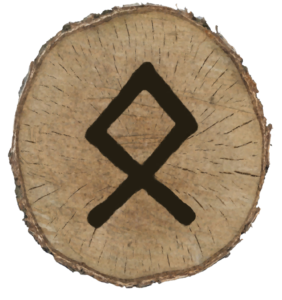Reclaiming The Heidhrinn Heart: Othala

By your Hallowed Names,
I charge this rune:
Othala.
Jord’s Rune;
Ancestor-Rune;
Rune of inheritance.
Sign of property and possessions; of spiritual heritage;
Of that which is truly most important to us.
I carve you thus;
With your help, I advise against a lack of order, totalitarianism, slavery, and that which would lead to an ill Wyrd.
I paint you the brown of cherished gravesides and good earth;
I prove you each time I embark on spiritual journeys; each time I honor my Ancestors and Hamingja.
I pray you: Remember.
I blot you each time I honor my Ancestors; with absinthe and wormwood.
I send you forth as security, increase, and abundance for myself;
Security, increase, and abundance for those I hold dear.
When time comes to draw you back, or to break you,
I counter you with Mannaz.–Connla Freyjason, Norse Witch: Reclaiming The Heidhrinn Heart
An angry mob marches down a Virginia street, shouting “blood and soil”, and bearing Viking-style shields and signs emblazoned with the Othala rune, rather than swastikas. A symbol of loving inheritance became, in that moment, a symbol of an inheritance of hate. Meanwhile, in New England, a shop specializing in serving the (apparently) small local Heathen community, finds its owners attacked for proudly displaying the Othala rune in their shop, and likewise exhibiting “Faith Folk Family” written in runes in their shop window. And I found myself writing, in the first chapter of Norse Witch: Reclaiming the Heidhrinn Heart:
This book needs to happen because an entire symbology and mythology of an ancient people—the Norse and Germanic peoples —is being bastardized again by a racist regime. Note that word: again. This is not the first time this has happened to this particular set of myths, Deities, and symbols, and if we do not stand up and take notice and say no more, it is destined to repeat itself over and over. And that needs to matter. That needs to matter deeply, because the next set of symbols, myths, and Deities which are thus stolen and bastardized might be your own, even if these are not.
In many ways, I wrote this book because I have been exhausted by the mob mentality and its ensuing witch hunts. Yes, we are living in dark times, yet we are not the first humans ever to do so: history is littered with times like these. From the Fall of Rome to the Antebellum South, and from the Holocaust to the Cultural Revolution, our Ancestors have weathered the fallout, the enslavement, the wars, the genocide, and the disenfranchisement wrought by mob rule. It is no different for us, in these times. But from such dark times, we also have the beacons of those who rose above them; those who refused to throw rocks at a time when those rocks were better used for rebuilding community: Marcus Aurelius, Robert Smalls, Elie Wiesel, Fang Lizhi. If we are to get through our own dark times, we must do the same: use the stones at our feet to rebuild, rather than tear down. That is the true message of Othala.
In fact, Othala advises against totalitarianism and slavery: the very same values that those marchers in Virginia of 2017 sought to uphold, as they marched through the streets of Charlottesville beneath their homemade, rune-emblazoned signs. It is also a rune of inheritance, reminding us (and them) that we live in a time when it is crucial that we choose the right side of that legacy. Certainly, ours is a legacy of rage and hatred, but it is also one hallmarked by hope; by the triumph of the human spirit, and victory over the oppressor. And we can choose on which side of that inheritance to live, for the counter of Othala is Mannaz:
By your Hallowed Names,
I charge this rune:
Mannaz.
Mani’s Rune;
Mankind’s Rune;
Rune of The Self and the individual.
Sign of friends and enemies; of social order;
Of strong opinions, intelligence, Divinity, and trusted assistance.
I carve you thus;
With your help, I advise against depression, delusion, cunning, and manipulation.
I paint you the blue and purple of the phases of the moon;
I prove you each time I act on my own behalf, voice my own opinion, or otherwise celebrate my own individuality.
I pray you: I.
I blot you by honoring the phases of the moon, my Ancestors, and the Alfar.
I send you forth as individuality and self-esteem for myself;
Individuality and self-esteem for those I hold dear.
When time comes to draw you back, or to break you,
I counter you with Gebo, Sowilo, Ehwaz, or Othala.–Connla Freyjason, Norse Witch: Reclaiming The Heidhrinn Heart
We cannot go through life focused solely on ourselves, on I, on me, and on mine. We must also look outside, for we are reminded with these two runes that the inheritance we are speaking of herein is shared. It isn’t solely the inheritance of the White, nor of the Black, nor of the Asian, nor the Jew; nor is it solely the inheritance of the Man, but also of the Woman, whether born-to-gender or assigned; whether Straight, or Gay, or Something Outside or In-Between.
We need a new paradigm of Folkishness, where the Folk means Humankind. The Folkish Movement in modern Heathenry has consistently taught that if one is not of Scandinavian/Germanic descent, then that person has no place in a Norse-based Faith. This has subsequently spawned Aryan ideals which lead to the sort of behaviors witnessed at Charlottesville, where anyone “not of the Folk” is other, and that other should be suppressed, trampled, and ultimately wiped out. Such attitudes have led me, as a man who lived in the South for twenty years, to desperately attempt to wipe the word “folks”, meaning simply “people” (as in Porky Pig’s “that’s all, folks!”) from my newly-gained vocabulary, in fear that if I say it too many times, people will assume that I mean it the same way “they” do. And then the rocks will start flying at me, in a time when none of us should be throwing rocks in the first place.
When I first encountered the Faith, Folk, and Family sign in my local Heathen shop’s window, I could not say for certain that the word Folk on that sign was meant in the same way that I mean it when I say it, for I am not the maker of that sign, nor even the displayer of it. What I knew was that if I thought for an instant those people remotely intended for it to mean what it has become in Folkish Heathenry, I never would’ve made it past the sign, and into the shop beyond. Had I jumped to conclusions, automatically assuming that they did, in fact, mean it in a Folkish Heathen way, I never would have had the good fortune of talking with that sign’s displayers and asking them, as fellow humans, precisely how they meant it. I would’ve just thrown rocks, like everyone else, instead of attempting to build community. Sure, there will always be those people who point out the possibility that the shopowners’ answers to my questions were dishonest; there is that possibility with any and every human dialogue. But if we are going to be that suspicious of everyone and everything, how can we ever hope to rise above these trying times? And if your own personal abilities at discernment are that off-base–to a degree that you cannot actively tell when someone is being honest with you or is lying–perhaps the problem lies within, rather than without. Such attitudes of being constantly suspicious make it impossible to actively build community.
In these trying times, Othala, both countered and coupled with Mannaz, should serve as a reminder to us that under the sky, there is but one family: humankind, and that family’s inheritance belongs to all of us. Our Faith should be in kindness, and in justice-bringing, and in benevolence. Our Folk should be all people, regardless of their race, creed, color, or gender-expression*. Our Family should be humanity. Anything else is unacceptable.

*I hate the term “gender-choice”. If you are Trans, Bisexual, Gay, Lesbian, Asexual, or any of the other gender-identifiers, it’s not a choice; it is an expression of your personal truth.


